 HOME
- EXHIBITION OVERVIEW
HOME
- EXHIBITION OVERVIEW
SECTIONS:
I. America as Refuge -
II. 18th Century America
III. American Revolution -
IV. Congress of the Confederation -
V. State Governments
VI. Federal Government -
VII. New Republic

VI. Religion and the Federal Government
[ PART 1 ] [ PART 2 ]
In response to widespread
sentiment that to survive the United States needed a stronger federal
government, a convention met in Philadelphia in the summer of 1787 and on September 17
adopted the Constitution of the United States. Aside from Article VI, which stated that "no
religious Test shall ever be required as Qualification" for federal office holders, the
Constitution said little about religion. Its reserve troubled two groups of Americans--those
who wanted the new instrument of government to give faith a larger role and those who feared
that it would do so. This latter group, worried that the Constitution did not prohibit the kind
of state-supported religion that had flourished in some colonies, exerted pressure on the
members of the First Federal Congress. In September 1789 the Congress adopted the First
Amendment to the Constitution, which, when ratified by the required number of states in
December 1791, forbade Congress to make any law "respecting an establishment of religion."
The first two Presidents of the United States were patrons of religion--George
Washington was an Episcopal vestryman, and John Adams described himself as "a church
going animal." Both offered strong rhetorical support for religion. In his Farewell Address
of September 1796, Washington called religion, as the source of morality, "a necessary spring
of popular government," while Adams claimed that statesmen "may plan and speculate for
Liberty, but it is Religion and Morality alone, which can establish the Principles upon which
Freedom can securely stand." Thomas Jefferson and James Madison, the third and fourth
Presidents, are generally considered less hospitable to religion than their predecessors, but
evidence presented in this section shows that, while in office, both offered religion powerful
symbolic support.

RELIGION AND THE CONSTITUTION
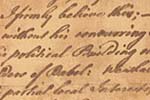 Franklin Requests Prayers in the Constitutional Convention
Franklin Requests Prayers in the Constitutional Convention
Benjamin Franklin delivered this famous speech, asking that the Convention begin each day's
session with prayers, at a particularly contentious period, when it appeared that the
Convention might break up over its failure to resolve the dispute between the large and small
states over representation in the new government. The eighty one year old Franklin asserted
that "the longer I live, the more convincing proofs I see of this Truth--that God governs in the
Affairs of Men." "I also believe," Franklin continued, that "without his concurring Aid, we
shall succeed in this political Building no better than the Builders of Babel." Franklin's
motion failed, ostensibly because the Convention had no funds to pay local clergymen to act as
chaplains.
Speech to the Constitutional Convention, June 28, 1787
Benjamin Franklin, Holograph manuscript
Manuscript Division, Library of Congress (145)
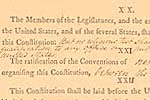 Prohibition of Religious Tests
Prohibition of Religious Tests
The language prohibiting religious tests as a qualification for federal office holders, ultimately
incorporated into Article Six of the Constitution, was proposed by Charles Pinckney of South
Carolina on August 20, 1787, and adopted by the full Convention on August 30. Here we see
the language as it was added to the first working draft of the Constitution, the so-called
Committee of Detail report of August 6, 1787, by the Convention secretary, William Jackson.
Constitution of the United States (William Jackson Copy),
Committee of Detail report
Broadside, August 6, 1787
Manuscript Division, Library of Congress (146)
|
When the Constitution was submitted to the American public, "many pious people"
complained that the document had slighted God, for it contained "no recognition of his
mercies to us . . . or even of his existence." The Constitution was reticent about religion for
two reasons: first, many delegates were committed federalists, who believed that the power to
legislate on religion, if it existed at all, lay within the domain of the state, not the national,
governments; second, the delegates believed that it would be a tactical mistake to introduce
such a politically controversial issue as religion into the Constitution. The only "religious
clause" in the document--the proscription of religious tests as qualifications for federal office
in Article Six--was intended to defuse controversy by disarming potential critics who might
claim religious discrimination in eligibility for public office.
That religion was not otherwise addressed in the Constitution did not make it an
"irreligious" document any more than the Articles of Confederation was an "irreligious"
document. The Constitution dealt with the church precisely as the Articles had, thereby
maintaining, at the national level, the religious status quo. In neither document did the people
yield any explicit power to act in the field of religion. But the absence of expressed powers
did not prevent either the Continental-Confederation Congress or the Congress under the
Constitution from sponsoring a program to support general, nonsectarian religion.
|

RELIGION AND THE BILL OF RIGHTS
|
Many Americans were disappointed that the Constitution did not contain a bill of rights that
would explicitly enumerate the rights of American citizens and enable courts and public
opinion to protect these rights from an oppressive government. Supporters of a bill of rights
permitted the Constitution to be adopted with the understanding that the first Congress under
the new government would attempt to add a bill of rights.
James Madison took the lead in steering such a bill through the First Federal Congress,
which convened in the spring of 1789. The Virginia Ratifying Convention and Madison's
constituents, among whom were large numbers of Baptists who wanted freedom of religion
secured, expected him to push for a bill of rights. On September 28, 1789, both houses of
Congress voted to send twelve amendments to the states. In December 1791, those ratified by
the requisite three fourths of the states became the first ten amendments to the Constitution.
Religion was addressed in the First Amendment in the following familiar words: "Congress
shall make no law respecting an establishment of religion, or prohibiting the free exercise
thereof." In notes for his June 8, 1789, speech introducing the Bill of Rights, Madison
indicated his opposition to a "national" religion. Most Americans agreed that the federal
government must not pick out one religion and give it exclusive financial and legal support.
|
![Proposed amendments to the Constitution of the United States [page one]](vc6497th.jpg) Proposed Constitutional Amendments
Proposed Constitutional Amendments
The Virginia Ratifying Convention approved the Constitution with the understanding that the
state's representatives in the First Federal Congress would try to procure amendments that the
Convention recommended. The twentieth proposed amendment deals with religion; it is an
adaptation of the final article in the Virginia Declaration of Rights of 1776 with this additional
phrase: "that no particular religious sect or society ought to be favored or established by Law
in preference to others."
Proposed amendments to the Constitution of the United States
[page one] -
[page two] -
[page three] -
[page four]
Virginia Ratifying Convention, Broadside, June 25, 1788
Rare Book and Special Collections Division,
Library of Congress (147)
![Objections to the Federal Constitution, [February 1788] [page one]](vc6653th.jpg)
![Objections to the Federal Constitution, [February 1788] [page two]](vc6654th.jpg)
Baptist Preacher's Objections to the Constitution
The influential Baptist preacher, John Leland, wrote a letter, containing ten objections to the
Federal Constitution, and sent it to Colonel Thomas Barbour, an opponent of the Constitution
in James Madison's Orange County district. Leland's objections were copied by Captain
Joseph Spencer, one of Madison's Baptist friends, and sent to Madison so that he could refute
the arguments. Leland's final objection was that the new constitution did not sufficiently
secure "What is dearest of all---Religious Liberty." His chief worry was "if a Majority of
Congress with the President favour one System more than another, they may oblige all others
to pay to the support of their System as much as they please."
Objections to the Federal Constitution, [February 1788]
[page one] -
[page two]
John Leland
Manuscript Division, Library of Congress (148)
|
![Notes for a speech introducing the Bill of Rights, [June 8, 1789] [page two]](vc6644th.jpg)
![Notes for a speech introducing the Bill of Rights, [June 8, 1789] [page one]](vc6643th.jpg) Madison's Notes for the Bill of Rights
Madison's Notes for the Bill of Rights
Madison used this outline to
guide him in delivering his speech introducing the Bill of Rights
into the First Congress on June 8, 1789. Madison proposed an amendment to assuage the
anxieties of those who feared that religious freedom would be endangered by the unamended
Constitution. According to The Congressional Register Madison, on June 8, moved that "the
civil rights of none shall be abridged on account of religious belief or worship, nor shall any
national religion be established, nor shall the full and equal rights of conscience be in any
manner, or on any pretext infringed."
Notes for a speech introducing the Bill of Rights, [June 8, 1789] [page one] -
[page two]
James Madison, Holograph notes
Manuscript Division, Library of Congress (149)
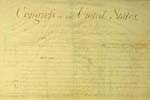 The Bill of Rights
The Bill of Rights
The necessary two thirds majority in each house of Congress ratified the Bill of Rights on
September 28, 1789. As sent to the states for approval, the Bill of Rights contained twelve
proposed amendments to the Constitution. Amendments One and Two did not receive the
required approval of three fourths of the states. As a result, Article Three in the original Bill
of Rights became the First Amendment to the Constitution. This copy on vellum was signed
by Speaker of the House Frederick Muhlenberg, Vice President John Adams, and Secretary of
State Samuel Otis.
The Bill of Rights (the John Beckley copy) September 28, 1789.
Holograph manuscript on
vellum
Manuscript Division, Library of Congress (150)
|

THE RHETORICAL SUPPORT OF RELIGION:
WASHINGTON AND ADAMS
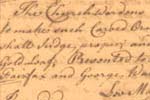 George Washington, Episcopal Vestryman
George Washington, Episcopal Vestryman
Washington was for many years a vestryman at Truro Parish, his local Episcopal Church. The
entry of June 5, 1772, shows Washington and his neighbor, George Mason, the author of the
Virginia Declaration of Rights, engaged in parish business, including making arrangements for
replacing the front steps of the church, painting its roof and selling church pews to the
members as a means of obtaining revenue. The minutes of the meeting also reveal that
Washington and George William Fairfax presented the parish with gold leaf to be used to gild
letters on "Carved Ornaments" on the altar.
The Vestry Book of Truro Parish, Virginia, 1732-1802
Manuscript volume
Manuscript Division, Library of Congress (152)
|
The country's first two presidents, George Washington and John Adams, were firm believers
in the importance of religion for republican government. As citizens of Virginia and
Massachusetts, both were sympathetic to general religious taxes being paid by the citizens of
their respective states to the churches of their choice. However both statesmen would have
discouraged such a measure at the national level because of its divisiveness. They confined
themselves to promoting religion rhetorically, offering frequent testimonials to its importance
in building the moral character of American citizens, that, they believed, undergirded public
order and successful popular government.
|
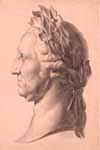 George Washington
George Washington
Chalk drawing on paper, ca. 1800, by St. Memin
Prints and Photograph
Division, Library of Congress. (151)
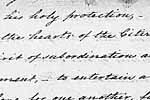 Washington's Prayer
Washington's Prayer
The draft of the circular letter is in the hand of a secretary, although the signature is
Washington's. Some have called this concluding paragraph "Washington's Prayer." In it, he
asked God to: "dispose us all, to do Justice, to love mercy, and to demean ourselves with that
Charity, humility and pacific temper of mind, which were the Characteristicks of the Divine
Author of our blessed Religion, and without an humble imitation of whose example in these
things, we can never hope to be a happy Nation."
Circular to the chief executives of the states, June 11, 1783
George Washington, Manuscript
Manuscript Division, Library of Congress (153)
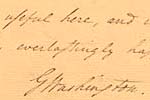
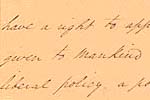 "To Bigotry no Sanction"
"To Bigotry no Sanction"
President George Washington and a group of public officials, including Secretary of State
Thomas Jefferson, left New York City, the temporary capital of the United States, on August
15, 1790, for a brief tour of Rhode Island. At Newport, Washington received an address of
congratulations from the congregation of the Touro Synagogue. His famous answer, assuring
his fellow citizens "of the Stock of Abraham" that the new American republic would give "to
bigotry no sanction, to persecution not assistance," is seen here in the copy from Washington's
letterbook.
George Washington to the Hebrew Congregation in New Port, Rhode Island [page one] -
[page two]
Manuscript copy, Letterbook 1790-1794
Manuscript Division. Library of Congress (154)
|

WASHINGTON'S FAREWELL ADDRESS
|
George Washington's Farewell Address is one of the most important documents in American
history. Recommendations made in it by the first president, particularly in the field of foreign
affairs, have exerted a strong and continuing influence on American statesmen and politicians.
The address, in which Washington informed the American people that he would not seek a
third term and offered advice on the country's future policies, was published on September 19,
1796, in David Claypoole's American Daily Advertiser. It was immediately reprinted in
newspapers and as a pamphlet throughout the United States. The address was drafted in July
1796 by Alexander Hamilton and revised for publication by the president himself.
Washington also had at his disposal an earlier draft by James Madison.
The "religion section" of the address was for many years as familiar to Americans as
was Washington's warning that the United States should avoid entangling alliances with
foreign nations. Washington's observations on the relation of religion to government were
commonplace, and similar statements abound in documents from the founding period.
Washington's prestige, however, gave his views a special authority with his fellow citizens
and caused them to be repeated in political discourse well into the nineteenth century.
|
![Draft of Washington's Farewell Address, [July] 1796.](vc6575th.jpg) Hamilton's Draft of Washington's Farewell Address
Hamilton's Draft of Washington's Farewell Address
George Washington's Farewell Address was drafted by Alexander Hamilton who made a
stronger case for the necessity of religious faith as a prop for popular government than
Washington was willing to accept. Washington incorporated Hamilton's assertion that it was
unreasonable to suppose that "national morality can be maintained in exclusion of religious
principle," but declined to add Hamilton's next sentence, written in the left margin of this
page: "does it [national morality] not require the aid of a generally received and divinely
authoritative Religion?"
Draft of Washington's Farewell Address, [July] 1796
Alexander Hamilton
Manuscript Division, Library of Congress (155)
![The Farewell Address. [page one]](vc6505th.jpg) The Farewell Address
The Farewell Address
In his Farewell Address, the first president advised his fellow citizens that "Religion and
morality" were the "great Pillars of human happiness, these firmest props of the duties of Men
and citizens." "National morality," he added, could not exist "in exclusion of religious
principle." "Virtue or morality," he concluded, as the products of religion, were "a necessary
spring of popular government." The "religion section" is located in the lower right portion
of page one and continues to the upper right portion of page two.
The Farewell Address [page one] -
[page two] -
[page three]
George Washington, Broadside
Rare Book and Special Collections Division,
Library of Congress (156)
|
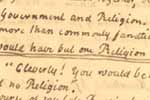 Adams on Religion
Adams on Religion
John Adams, a self-confessed "church going animal," grew up in the Congregational Church
in Braintree, Massachusetts. By the time he wrote this letter his theological position can best
be described as Unitarian. In this letter Adams tells Jefferson that "Without Religion this
World would be Something not fit to be mentioned in polite Company, I mean Hell."
John Adams to Thomas Jefferson, April 19, 1817
[page one] -
[page two] -
[page three] -
[page four]
Holograph letter
Manuscript Division, Library of Congress (157)
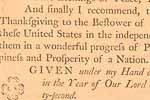 Adams's Fast Day Proclamation
Adams's Fast Day Proclamation
John Adams continued the practice, begun in 1775 and adopted under the new federal
government by Washington, of issuing fast and thanksgiving day proclamations. In this
proclamation, issued at a time when the nation appeared to be on the brink of a war with
France, Adams urged the citizens to "acknowledge before God the manifold sins and
transgressions with which we are justly chargeable as individuals and as a nation; beseeching
him at the same time, of His infinite grace, through the Redeemer of the World, freely to
remit all our offences, and to incline us, by His Holy Spirit, to that sincere repentance and
reformation which may afford us reason to hope for his inestimable favor and heavenly
benediction."
Fast Day Proclamation, March 23, 1798.
John Adams. Broadside
Rare Book and Special Collections Division, Library of Congress (158)
|
[ PART 1 ] [ PART 2 ]
 HOME -
EXHIBITION OVERVIEW
HOME -
EXHIBITION OVERVIEW
SECTIONS:
I. America as Refuge -
II. 18th Century America
III. American Revolution -
IV. Congress of the Confederation -
V. State Governments
VI. Federal Government -
VII. New Republic

|

 Franklin Requests Prayers in the Constitutional Convention
Franklin Requests Prayers in the Constitutional Convention Prohibition of Religious Tests
Prohibition of Religious Tests![Proposed amendments to the Constitution of the United States [page one]](vc6497th.jpg) Proposed Constitutional Amendments
Proposed Constitutional Amendments![Objections to the Federal Constitution, [February 1788] [page one]](vc6653th.jpg)
![Objections to the Federal Constitution, [February 1788] [page two]](vc6654th.jpg)
![Notes for a speech introducing the Bill of Rights, [June 8, 1789] [page two]](vc6644th.jpg)
![Notes for a speech introducing the Bill of Rights, [June 8, 1789] [page one]](vc6643th.jpg) Madison's Notes for the Bill of Rights
Madison's Notes for the Bill of Rights The Bill of Rights
The Bill of Rights George Washington, Episcopal Vestryman
George Washington, Episcopal Vestryman
 Washington's Prayer
Washington's Prayer
 "To Bigotry no Sanction"
"To Bigotry no Sanction"![Draft of Washington's Farewell Address, [July] 1796.](vc6575th.jpg) Hamilton's Draft of Washington's Farewell Address
Hamilton's Draft of Washington's Farewell Address![The Farewell Address. [page one]](vc6505th.jpg) The Farewell Address
The Farewell Address Adams on Religion
Adams on Religion Adams's Fast Day Proclamation
Adams's Fast Day Proclamation